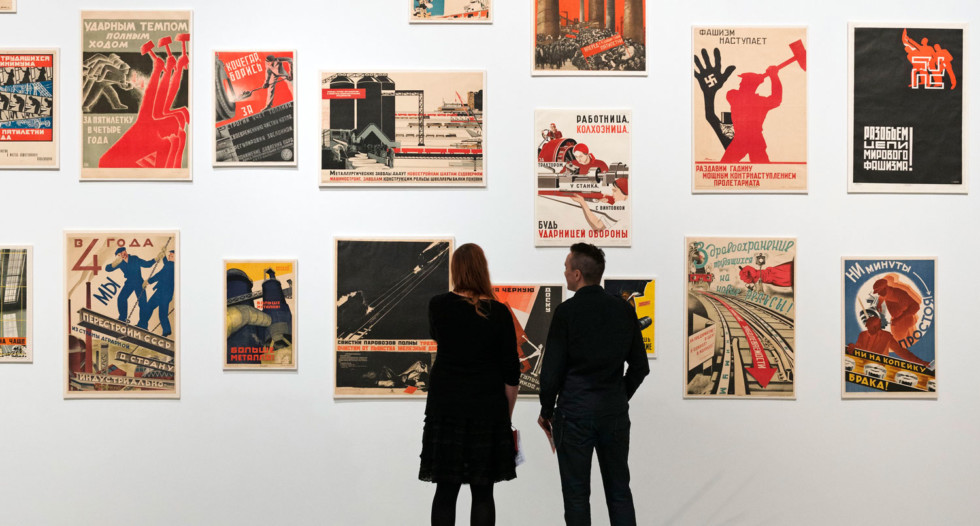
Soviet posters from the Moderna Museet collection. Photo: Åsa Lundén/Moderna Museet
100th Anniversary of the Russian Revolution
A conference and guided tours about the Russian Revolution and art
21.10 2017 – 24.10 2017
Stockholm
The Russian Revolution has become a cultural symbol
In October one hundred years ago, the Russian Revolution took place. Its political, social and economic impact are still felt to this day. The Revolution has come to be a cultural symbol, and its utopian ideas in the field of art continue to inspire new interpretations.
Russian Avant-Garde in the Moderna Museet collection
There was an artistic avant-garde with links to the political Russian Revolution. The Russian avant-garde in the Moderna Museet collection is uniquely represented through a number of significant works. Artists currently featured include Alexandra Exter, Anna Kagan, Liubov Popova, Vladimir Tatlin and Alexander Rodchenko.
Conference
1917–2017: 100 Years of Russian Revolution in Art and Aesthetics
Welcome to a conference with lectures and discussions. The conference brings together international scholars and researchers in the fields of art history, cultural theory, media studies and aesthetics, to explore the relationships between art and politics. The theme of the conference is the Russian Revolution as a historic event, and how it inspires art with revolutionary ambitions today.
Date: Saturday 21 October 2017
Time: at 10–18
Place: the Auditorium, floor 2
Language: English
Price: admission free
Conference events take place at Södertörn University, Färgfabriken and Moderna Museet
The conference, which explores a few key concepts in visual arts, media, literature, aesthetics and film-making, will take place at Färgfabriken on 19 October, Södertörn University on 20 October, and Moderna Museet on 21 October. The keynote speaker at Södertörn University is Katerina Clark, while Christina Kiaer, professor of art history at Northwestern University, New Haven, USA, will present new perspectives on Soviet propaganda posters in her keynote speech on “Revolution Every Day” at Moderna Museet.
The conference is organised by Center for Baltic and East European Studies (CBEES) at Södertörn University, in association with Moderna Museet and Färgfabriken.
Guided tour
Women in the Russian Avant-Garde
Join our guided tour of works in the collection, and learn more about a relatively gender-equal modernist movement. Art historian Sara Callahan talks about the women in the Russian avant-garde.
Date: Saturday 21 October 2017
Time: at 16
Place: the Collection, floor 4
Language: Swedish
Price: admission free
Compared to other modernist movements, which were largely dominated by men, women in the Russian avant-garde had a strong position and were regarded as equals. Together with their male colleagues, they were dedicated to the needs of the revolutionary society, progressing from various styles of abstract painting to more functional applications for a proletarian art, reflecting urban and industrial life.
Guided tour
Ann-Sofi Noring, co-director of Moderna Museet, on Alexander Rodchenko
Hear Ann-Sofi Noring on one of the leading artists of the Russian avant-garde. Alexander Rodchenko took unconventional photographs, with bold, astonishing perspectives. This tour tells you more about him and a few of the other Russian avant-garde artists in the Moderna Museet collection.
Date: Tuesday 24 October 2017
Time: at 17.30
Place: the Collection, floor 4
Language: Swedish
Price: admission free
Tickets: Ticket is avaliable in the information desk the same day. Limited availability. No advance booking.
The Russian Revolution in 1917 was one of the most turbulent events of the 20th century. A decade before the Revolution, a modernist art movement began to emerge in Russia. Many artists embraced an aesthetic avant-garde that shared the revolutionary ideals. They wanted to break free from traditions and create a new art for the people. Initially, this visionary art was supported by the new regime, but later it was rejected and disappeared in the early 1930s.
One of the leading avant-garde artists was Alexander Rodchenko, who originally worked in various media but eventually devoted himself almost entirely to photography, which he considered to be the medium of the time, and used it to take unconventional pictures with bold, surprising perspectives. Today, Rodchenko is regarded as a pioneer of photography.
Contact: Karin Malmquist, Curator Learning
